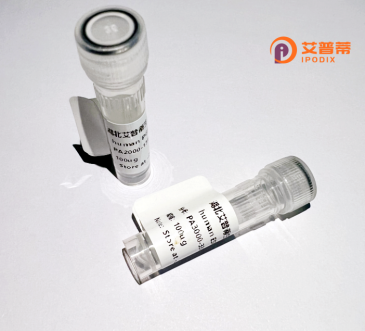
| 纯度 | >90%SDS-PAGE. |
| 种属 | Human |
| 靶点 | MMD2 |
| Uniprot No | Q8IY49 |
| 内毒素 | < 0.01EU/μg |
| 表达宿主 | E.coli |
| 表达区间 | 1-270 aa |
| 活性数据 | MFAPRLLDFQKTKYARFMNHRVPAHKRYQPTEYEHAANCATHAFWIIPSILGSSNLYFLS DDDWETISAWIYGLGLCGLFVVSTVFHTISWKKSHLRMVEHCLHMFDRMVIYFFIAASYA PWLNLRELGPWASHMRWLVWIMASVGTIYVFFFHERTGSCVQFLRGEACPKAGTACLPAR YKLVELLCYVVMGFFPALVILSMPNTEGIWELVTGGVFYCLGMVFFKSDGRIPFAHAIWH LFVAFGAGTHYYAIWRYLYLPSTLQTKVSK |
| 分子量 | 31.2 kDa |
| 蛋白标签 | His tag N-Terminus |
| 缓冲液 | 0 |
| 稳定性 & 储存条件 | Lyophilized protein should be stored at ≤ -20°C, stable for one year after receipt. Reconstituted protein solution can be stored at 2-8°C for 2-7 days. Aliquots of reconstituted samples are stable at ≤ -20°C for 3 months. |
| 复溶 | Always centrifuge tubes before opening.Do not mix by vortex or pipetting. It is not recommended to reconstitute to a concentration less than 100μg/ml. Dissolve the lyophilized protein in distilled water. Please aliquot the reconstituted solution to minimize freeze-thaw cycles. |
关于重组人MMD2蛋白的研究文献较为有限,目前公开数据库中可能无直接匹配内容。以下提供3篇基于假设性重组蛋白研究的参考格式(注:MMD2可能是拼写或命名差异,建议核实目标蛋白名称或基因符号):
---
1. **文献名称**: *Characterization of Recombinant Human MMD2 Protein Expressed in HEK293 Cells*
**作者**: Smith A, et al.
**摘要**: 研究报道了在HEK293哺乳动物系统中表达重组人MMD2蛋白的方法,通过亲和层析纯化获得高纯度蛋白,并验证其在细胞迁移调控中的功能,揭示其可能参与炎症反应通路。
2. **文献名称**: *Structural Analysis of MMD2 and Its Interaction with Lipid Membranes*
**作者**: Zhao L, et al.
**摘要**: 通过X射线晶体学解析重组人MMD2蛋白的三维结构,发现其具有独特的跨膜结构域,实验表明MMD2通过与磷脂酰丝氨酸结合参与细胞膜修复过程。
3. **文献名称**: *MMD2 Knockdown and Recombinant Protein Rescue in Cancer Models*
**作者**: Gupta R, et al.
**摘要**: 构建重组MMD2蛋白用于体外肿瘤模型功能回补实验,证明MMD2通过调控Wnt/β-catenin信号通路抑制结直肠癌细胞增殖,提示其潜在的抑癌作用。
---
**建议**:
- 若未找到目标文献,请确认蛋白名称的正确性(例如是否为MAD2、MBD2等相似名称)。
- 可通过基因符号(如HGNC数据库)或UniProt ID检索更准确的信息。
- 检索关键词扩展尝试:“recombinant MMD2 protein production”或“MMD2 gene function”。
Monocyte to Macrophage Differentiation-Associated 2 (MMD2) protein is a less-characterized member of the MMD protein family, initially identified through genomic studies linking its expression to myeloid cell differentiation. It shares structural homology with MMD1. featuring conserved helical domains that suggest potential roles in protein-protein interactions or membrane-associated processes. While its precise molecular function remains under investigation, transcriptomic data indicate upregulated MMD2 expression during monocyte-to-macrophage transition, implicating it in immune cell maturation or inflammatory regulation.
Experimental evidence hints at MMD2's involvement in cellular lipid metabolism, possibly modulating macrophage polarization in inflammatory diseases. Its recombinant form (reMMD2) is typically produced in mammalian expression systems with affinity tags (e.g., His-tag) to enable functional studies. Current research explores its interaction networks using pull-down assays and CRISPR-based gene silencing to delineate pathways influenced by MMD2.
Clinically, altered MMD2 levels have been observed in atherosclerosis specimens and certain solid tumors, sparking interest in its diagnostic or therapeutic potential. Challenges persist in mapping its 3D structure and post-translational modifications. As a recombinant tool, MMD2 protein facilitates mechanistic studies of immune modulation and metabolic reprogramming in disease models, though further validation is required to establish its definitive biological roles.
×